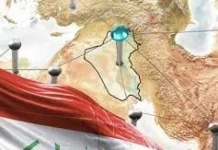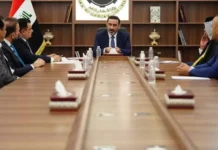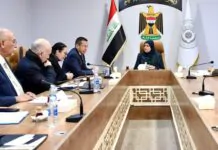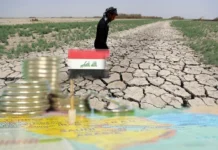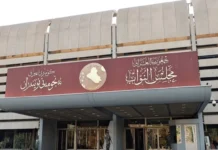Tishwash: The Prime Minister emphasizes the need to proceed with economic and financial reform plans.
Prime Minister Mohammed Shia al-Sudani stressed on Sunday the need to proceed with economic and financial reform plans, directing the Ministry of Electricity to study economic models for investment projects.
The Prime Minister’s Media Office said in a statement received by the Iraqi News Agency (INA) that “Prime Minister Mohammed Shia Al-Sudani chaired a meeting today, Sunday, dedicated to following up on the financial dues for energy projects (electricity and oil), in the presence of the Minister of Finance, the Ministers of Oil and Electricity, and a number of advisors and executive officials in the ministries.”
The statement added, “During the meeting, ways to maximize public treasury revenues were discussed by increasing export capacity of petroleum products (diesel, naphtha, black oil, condensates) and other products after achieving self-sufficiency.”
He continued, “The meeting witnessed a discussion on setting a mechanism for the flow of revenues, and restricting the export of oil products through the State Oil Marketing Company (SOMO),” adding that “with regard to the electricity sector, Al-Sudani directed the Ministry of Electricity to study the economic models for investment projects.”
The Prime Minister stressed – according to the statement – the need to proceed with economic and financial reform plans, especially with regard to benefiting from oil wealth, and raising the percentage of crude oil refining in accordance with the targeted plans to produce more high-quality and valuable oil derivatives. link
************
Tishwash: Al-Araji: Iraq is committed to building balanced relations with all countries of the world.
The Ministry of Foreign Affairs confirmed on Sunday that Iraq has played an important role in promoting regional stability over the past years.
The Ministry said in a statement followed by Al-Masra, “The Ministry of Foreign Affairs held a special session today to introduce the Iraqi National Security Strategy (Iraq First), during which it hosted National Security Advisor Qasim Al-Araji, and in the presence of the Undersecretary of the Ministry for Multilateral Affairs and Legal Affairs, Ambassador Shorsh Khalid Saeed, and the Head of the Organizations Department, Ambassador Fadel Al-Rahim, in addition to a number of heads of departments in the Ministry’s headquarters and representatives of Arab and foreign diplomatic missions operating in Iraq.”
Undersecretary Shorsh Khalid Saeed opened the session with a speech in which he welcomed the advisor and the attendees, noting that “the Ministry has contributed effectively to the preparation of the strategy for the period (2025–2030), which aims to address security, environmental, economic and social challenges.”
He added that “the session witnessed interventions by a number of heads of diplomatic missions, during which they raised questions and proposals related to the items of the strategy, and the advisor to the Undersecretary of the Ministry took it upon himself to answer them and clarify its various aspects.”
He emphasized “the proactive role that Iraq has played in recent years in promoting regional stability,” and praised “the great efforts made by the committee responsible for preparing the strategy, and its keenness to include the role of foreign policy in promoting international cooperation.”
For his part, the National Security Advisor expressed his gratitude to the Ministry of Foreign Affairs and diplomatic missions, reviewing the most prominent challenges that Iraq faced during the past period and the pivotal role of the leadership in overcoming them and consolidating state institutions.
He pointed out that “the preparation of the national security strategy involved all state institutions, along with international organizations and civil society organizations,” stressing that “these entities are considered partners in its implementation.”
He stressed that “Iraq is committed to building balanced relations with all countries of the world, based on mutual respect and non-interference in internal affairs,” praising “the important role played by the Ministry of Foreign Affairs in consolidating international relations.”
He reviewed the five main pillars of the strategy, which are: the security and intelligence pillar, the economic pillar, the pillar of state relations and international partnerships, the pillar of community security, and the pillar of public services.
He pointed to “the importance of institutional evaluation and encouraging volunteer work,” and gave the delegations a brief overview of the success of the parliamentary elections that took place in Iraq.
He praised “the efforts of the government, the commission and the security services in conducting safe and stable elections that promote the peaceful transfer of power,” noting that “Iraq has succeeded in the Al-Hol camp file through the national measures and efforts that have been taken.”
The Chairman of the Standing Committee for National Security Strategy, Ali Abdul Aziz Al-Yassiri, gave a detailed explanation regarding the strategy’s axes and outputs. link
*************
Tishwash: KRG Prime Minister Welcomes USKBC Delegation as Kurdistan Deepens Business Ties with American Investors
Meeting highlights investment reforms, sectoral opportunities, and the Kurdistan Region’s expanding role as a secure hub for U.S. capital.
Kurdistan Region Prime Minister Masrour Barzani on Sunday received a delegation from the U.S.-Kurdistan Business Council (USKBC), led by its President David Tafuri, as the autonomous region continues to position itself as one of the Middle East’s most open and secure environments for American and diaspora investment.
The meeting was held as the Kurdistan Region deepens economic engagement with U.S. companies, driven in part by its foreign-investor-friendly legal framework and an expanding strategy to attract diaspora capital—especially from Assyrian, Chaldean, and Syriac communities seeking to rebuild commercial and cultural links with their ancestral homeland.
At the start of the meeting, Tafuri congratulated Prime Minister Barzani on the outcome of Iraq’s recent parliamentary elections and outlined the purpose of the delegation’s visit, stressing the Council’s commitment to expanding American commercial partnerships across the Kurdistan Region.
He also briefed KRG officials on the composition of the visiting delegation, which includes U.S. business leaders, legal experts, and investors exploring opportunities in key economic sectors.
Prime Minister Barzani provided an overview of recent political developments in both the Kurdistan Region and Iraq, underscoring the KRG’s institutional reforms and improved governance under the ninth cabinet.
He highlighted major advancements in the energy sector—particularly natural gas development—as well as ongoing measures to modernize the region’s economic infrastructure and regulatory environment.
Barzani reiterated the government’s strong commitment to enabling and expanding the presence of American companies in the Kurdistan Region.
The visit follows a larger U.S. and Assyrian-American economic outreach effort to the Kurdistan Region, where diaspora entrepreneurs have been examining long-term opportunities supported by Investment Law No. 4 of 2006.
The law allows 100 percent foreign ownership, long-term land use rights, significant tax exemptions, and full repatriation of profits—legal advantages unmatched elsewhere in Iraq, where federal regulations require majority local ownership.
These policies have created renewed momentum for Assyrian diaspora investment, as communities seek sustainable ways to preserve their heritage while fostering economic resilience in historic areas like Ankawa, Alqosh, Amedi, and the broader Nineveh Plains.
During recent meetings with senior KRG officials, including PM Barzani and Board of Investment Chairman Mohammad Shukri, U.S.-based Assyrian investors discussed a range of potential ventures in education, healthcare, agriculture, tourism, and cultural preservation.
On Saturday evening, Board of Investment spokesperson Bargasht Akrayee confirmed that Tafuri’s delegation would meet with top KRG officials, investors, and business leaders across the region to explore joint projects. The USKBC—an influential Washington-based organization—has long played a key role in promoting U.S.-Kurdistan economic ties, frequently organizing visits for American businesses seeking to enter the Kurdish market.
The Kurdistan Region’s comparative stability, legal predictability, and investor-friendly climate have gained growing attention among U.S. business circles. For diaspora groups—particularly Assyrians—the region offers a rare opportunity to build commercial ventures with full ownership, legal protections under international arbitration standards, and a political environment supportive of minority rights.
“This is a historic moment for Assyrians who wish to invest in their homeland,” said Alexander Karana, an American attorney who accompanied the recent delegation, in an analysis published by Global Strat View.
Karana emphasized that the Kurdistan Region’s investment laws allow diaspora communities to participate in economic growth “with dignity, security, and purpose,” reinforcing both cultural identity and long-term communal stability.
As Prime Minister Barzani continues to encourage foreign and diaspora investment, the meeting with the USKBC delegation signals a broader KRG strategy: leveraging international partnerships, nurturing minority-led economic initiatives, and transforming the Kurdistan Region into a regional hub for sustainable, diversified, and globally connected development. link

